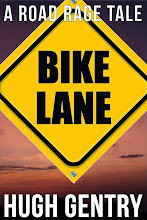I have given this caveat a couple of times on other threads, but let me say it so you understand my viewpoint. I have not finished a book, so I have not tried to be published and I do not know anything about the inner-workings of publishing companies. Some of my information has come from various boards, Joe Konrath’s blog, or other blogs/websites/conversations. My assumptions may not be exactly accurate, but they are the assumptions that I am working under. I am looking at this from an emotionally detached, business perspective.
First assumption: out of every five books, two make money, one breaks even and two lose money. The break even book will help them with G&A (salaries, real estate facilties, amortization, etc.), so actually forty percent of their products lose money.
Second assumption: publishers and bookstores have to sell a LOT of books to make money. Your local 25,000 square foot Borders (say in San Antonio) was probably paying $35/sf/year just in rent (this does not include any percentage of sales that they may have been obligated to pay to the landlord). Let’s call their annual lease obligation $1mm, which does not include salaries, benefits, inventory, etc. Borders obviously did not sell enough books.
Let’s also keep in mind that if one of the innocuous Big 6 leases 100,000 square feet in Midtown Manhattan, their office lease may cost then $7.5mm/year (an assumption).
Third assumption: definition of mid-list author. I don’t have any idea, but let’s ascribe mid-list authors as producing the books that only break even or lose money, for this analysis.
Fourth assumption: companies are in business to sell products or services to make money. (Can we all agree on this one?)
Fifth assumption: there is an ebook revolution happening.
Sixth assumption: when you are working with upper management in large corporations (publishers, energy companies, engineering companies, etc.), you are working with very intelligent people. They may be dinosaurs, but they are not stupid. Large corporations are not terribly agile.
Seventh assumption: there is an exception to every rule.
Let’s look at it from the publisher’s perspective:
Bookstores will downsize, meaning less shelf space and less product we have to produce to fill those shelves. Which authors should we renew and which ones should we cut? Well, let’s cut the ones that lose money first. And then let’s cut some of the mid-list authors that break even or make marginal profits. What do we have left? Tada! Authors that write books that make a profit.
Pssst, Mr./Mrs. Publisher, hey, uh, there’s an ebook revolution going on by the way. Oh yeah, sure we’re dinosaurs, but so are a lot of the bestselling authors that are signed with us. Besides, we have 15 out of the top 20 in the Kindle 100, some of them at $14.99! The audacity! AND we don’t even have to print a book! More audacity!
Yeah yeah, there are some of these indie authors out there that are making some sales. Let’s pick the top sellers and we’ll wallet whip ‘em with a big ole check. John Locke? He sells a lot, but at ninety-nine cents?? Where’s the ROI in that?
Overall, this doesn’t sound like too poor of a plan. Scrap the authors that lose money, pick up some authors from the minors that can make money, streamline along the way (thus cutting G&A) and keep printing money.
It’s the agent of mid-list authors that are desperate, because their authors are getting iced. Whatever the opposite of desperate is, that is what the boogeyman publishers are.
Just my thoughts, go ahead and punch holes in it. But Brother Bluto, what about the revolution? What about the publisher’s degringolade? They may be slow, but they are smart and will adapt.
Viva la revolucion! Incoming....................



